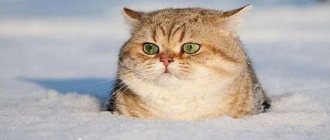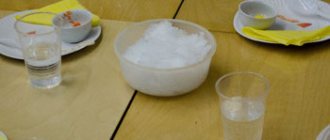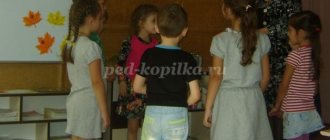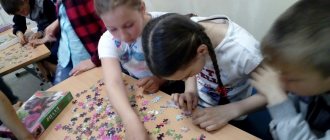Summary of a lesson on speech development in the preparatory group of a preschool educational institution. How animals prepare for winter
Lesson on speech development in a speech therapy group “How animals prepare for winter”
Author: Dunaeva Liliya Grigorievna, teacher-speech therapist of preschool educational institution No. 287 in Donetsk, Donetsk region Description of the material: this material will be useful for teachers in working with children of preschool and primary school age. Correctional and educational goals.
Consolidating ideas about wild animals, their appearance, lifestyle, habits.
Improving the lexical and grammatical structure of speech. Corrective and developmental goals.
Development of coherent speech, attention, fine and gross motor skills, coordination of speech with movement, and orientation skills on a plane.
Correctional and educational goals.
Formation of skills of cooperation, mutual understanding, goodwill, independence, initiative.
Fostering a caring attitude towards nature. Equipment.
Attributes for the game “What kind are you?
What are you?”, an envelope with riddles, a box of sand, chestnuts, cones, reed sticks, dry leaves, feathers, maple wings, moss, dry tree branches, Christmas tree branches, large and small stones, fake mushrooms. Preliminary work.
Conversation about the life of wild animals. View illustrations, computer presentations, read poetry, riddles about wild animals. Learning finger gymnastics.
Progress of the lesson
Speech therapist: Guys, what time of year is it now? (autumn) What is the weather today? (cold, cloudy...) Speech therapist: Cold, windy outside, Hands are freezing in November. Late autumn brings the first snow and the first ice. What time of year will come after autumn? (winter) Speech therapist: You are right, a cold, frosty, snowy winter will come soon. I wonder what is happening in the forest now? In winter, it will be difficult for animals to find food for themselves; there will be no grass, no mushrooms, no berries. Do you want to know how animals prepare for winter? To do this we need to go into the forest.
I invite you to go for a walk in the forest today.
We guys can't find a more interesting adventure. Stand next to each other, hold hands tightly, along the paths, along the paths, let's go for a walk in the forest. And you and I will definitely find forest animals. Psycho-gymnastics
Journey into the forest
The recording “Autumn in the Forest” is playing (sounds of wildlife) Here we are in the forest.
What soft moss underfoot! We walk along it silently, on tiptoes... There is an impassable thicket ahead. Follow me. Let's go along the narrow path. Don't lag behind, follow me exactly... Trees fell after a strong wind. We will have to climb over them... We found ourselves in a strip of spruce forest. Walk carefully, move the thorny branches apart, lift them, don’t prick yourself... Speech therapist: Guys, look, there’s some kind of envelope on the stump. It was the forest dwellers who left it for us. I wonder what's in it? Forest animals want to play with you, they have written riddles about themselves. Which animal can say that about itself?
• I won’t stock up on food for the winter; I’ll find something to eat anyway, because I’m very cunning. (fox) What does a fox eat in winter? (catches hares, mice) • I’ll stock up on food for the winter and insulate my home. (squirrel) What reserves does squirrel make for the winter? (nuts, mushrooms, acorns) How does a squirrel prepare its home for winter? (warms with moss and dry grass) • I’ll put on a white fur coat for the winter and hide deep in the snow. (hare) What does a bunny eat in winter? (gnaws branches of aspen and birch, eats dry grass) • I won’t stock up on food for the winter, because I’ll sleep all winter. (bear) Where does the bear sleep? (in the den) What does a bear eat in the summer? (berries, nuts, small animals, enjoys honey, fish) • I look like a cat, I can jump in trees and I’m dangerous even for people. (lynx) What does a lynx eat in winter? (catches birds, hares, mice) • I won’t stock up on food, I’ll insulate the hole, curl up in a ball and sleep until spring. (hedgehog) What does a hedgehog eat in the summer? (fruits, berries, worms, beetles, snails, mice) Speech therapist: The forest is a big home for many animals.
Remember what animals live in the forest? (wolves, bears...). Are you right, there are a lot of people in the big forest? (wolves, bears, ...) Why are these animals called wild? (they live in the forest, get their own food, raise their own cubs, build their own homes). Tell me, what is the main concern of animals in the fall? (prepare for winter). Why? (it’s cold in winter, there’s no food, everything is covered in snow). Game “What are you?
What are you like? Speech therapist: Guys, I suggest you play. I put animal masks on you, and you name the signs of “your” beast. Speech therapist: Bear, what are you? Child: I am clubfooted, big, strong, brave, shaggy...
Speech therapist: Fox, what are you like? Child: I am beautiful, fluffy, cunning, smart, dexterous, smart, careful...
Speech therapist: Hare, what are you? Child: I am white, timid, sensitive, careful, dexterous, fast, long-eared...
Speech therapist: Wolf, what are you? Child: I am gray, angry, hungry, dangerous, predatory, fast...
Speech therapist: Squirrel, what are you like?
Child: I am red-haired, small, dexterous, fast, thrifty, timid... Speech therapist: Hedgehog, what are you like?
Speech therapist: I am careful, prickly, small, sensitive... Speech therapist: Listen carefully to the music and show the movements of the animal depicted on your mask. As soon as the music ends, you must find the tail of “your” animal on the stump and say whose tail it is (bear, fox, hare, wolf, squirrel, hedgehog) Speech therapist: How interesting the animals told about themselves and correctly found their tails.
I suggest you remember once again what animals live in the forest. Speech with movement
From your fingers, my friend, make a tower. (palms folded in corners) This is the gate, (palms in front of you) This is the castle, (“castle”) This is the window, (“window”) This is the pipe. (raise your hands up) All wild animals, hurry here. (hands forward, grasping movements) And here is a horned elk, (cross your palms) And a shaggy bear, (clench and unclench your fingers) And a prickly hedgehog, (interlace your fingers) A jumping squirrel. (2 claps) Here is a little white bunny, (“ears” from the fingers of the left hand) Here is a red fox, (“muzzle” from the fingers of the right hand) And a gray wolf cub, (“claws” from the fingers of the left hand) And a gray mouse. (“muzzle” from the fingers of the right hand)
Speech therapist: Guys, it’s very difficult for wild animals to prepare their homes for winter. Tell me who lives where. The bear is looking for ... (den). The squirrel insulates...(hollow). The fox is looking for ... (hole). The wolf makes ... (a lair). The hare is sleeping...(under a bush). The hedgehog insulates ... (mink). Do you agree to help wild animals build homes for the winter? Speech therapist: Guys, you did a good job. I'm sure the wild animals really liked the homes you built.
We recommend watching:
Notes on speech therapy for the senior group Notes on a psychological lesson in 2nd grade. Emotions Summary of an integrated lesson on the development of speech and theatrical activities in preparatory Articulation gymnastics for preschool children
Similar articles:
Musical lesson using logorhythmics in the senior group of a preschool educational institution
Summary of an integrated lesson on the topic “Animals” in the senior group
Lesson summary - travel for children of the senior group of preschool educational institutions on the topic: Birds
Summary of an integrated lesson on the topic “Space”. Senior group
Lesson summary on the topic “Musical Instruments” in the preparatory group




